A Letter for Evie

Brief Synopsis
Cast & Crew
Jules Dassin
Marsha Hunt
John Carroll
Hume Cronyn
Spring Byington
Pamela Britton
Film Details
Technical Specs

Synopsis
Evie O'Connor, a secretary at the Trojan Shirt Company in Brooklyn, New York, dreams of a romance with a tall, strong man, one who might fit into a Trojan size sixteen-and-a-half shirt. After learning that many of her fellow co-workers routinely place notes in the pockets of the company's shirts, Evie writes a personal letter and places it in a size sixteen-and-a-half shirt that is destined for an army camp. The shirt makes its way to Private Edgar "Wolf" Larsen, a notorious womanizer, who reads her letter to his pal John Phineas McPherson and, after dismissing it as nonsense, throws it away. Johnny, however, is intrigued by Evie's note and secretly retrieves it. Ignoring Evie's taste for tall and strong men, Johnny, who is short and rather homely, believes that he can win her over with his mind and heart and begins corresponding with her. Complications soon arise, however, when Evie requests that Johnny, who has described himself as being of Wolf's dimensions, send a picture of himself. Afraid that she will reject him if she knows what he really looks like, Johnny sends her a picture of Wolf. One day, Johnny's unit passes through New York, and unable to resist the temptation to meet Evie, he poses as his "friend" Wolf and visits her. Johnny falls instantly in love with Evie, but instead of revealing his true identity, he continues to deceive her. Wolf eventually discovers the letters that Evie sent to Johnny and when Johnny next visits Evie, he make an unexpected appearance at her apartment. Chaos ensues when Johnny clumsily tries to prevent a single intimate moment between Evie and Wolf, and when Evie's roommate, Barney Lee, desperately tries to seduce Johnny. Driven to desperation, Johnny decides to feign drunkenness and causes a scene to force Wolf and Evie apart. His scheme works, and once outside Evie's building, Johnny punches Wolf and orders him to keep away from Evie, insisting that she is not one of his "lollipops." Wolf ignores Johnny's command and secretly visits Evie the next day, but Johnny discovers the truth when he telephones Evie and Wolf answers. Furious, Johnny rushes to her apartment and sets a smoke pot on fire in the hallway to smoke them out. Trying to escape, Wolf falls and knocks his head, and while semi-conscious, proposes marriage to Evie. The marriage does not take place, however, as both Wolf and Johnny are given overseas orders the next day. During their overseas mission, Wolf quickly forgets Evie and marries a French woman, while Johnny continues to write to Evie, shielding her from the painful truth. Evie, meanwhile, discovers Johnny's true identity when she visits his mother and sees pictures of him. Time passes, and Evie, having sworn off both men as liars, shows little respect for Johnny when he visits her. She eventually has a change of heart, however, when she realizes that Johnny is truly in love with her. After revealing to Johnny that she knows who he is, she embraces him and they kiss.

Director

Jules Dassin
Cast
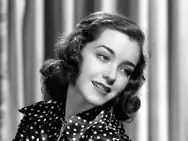
Marsha Hunt

John Carroll

Hume Cronyn

Spring Byington

Pamela Britton

Norman Lloyd
Percival Vivian

Donald Curtis
Esther Howard
Robin Raymond
Therese Lyon
Lynn Whitney

Michael Kirby
Bob Brown
Fred Fisher
Dick Crockett
Dolores Dey
Bryn Davis
Mercedes Mockaitis
Marjorie Henderson
Alix Nagy
Margaret White
Rod Rogers
Lennie Bremen
Arthur Walsh
Forbes Murray
Harry Depp
Art Miles
Aminta Dyne

Ray Teal
Sharon Mcmanus
Zaz Vorka
Beverly Haney
Diane Garrett
Vic Parkas
Frank Evers
Walter Pietila
Don Brodie
Harry Rose
Mona Gutierrez
Sonny Lamont
Harry Woolman
Bob Alden
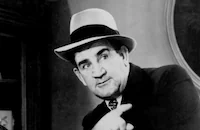
Tom Kennedy
Walter Soderling
Edgar Sherrod

Evelyn Dockson
Robert E. O'connor
Garry Owen
Ernie Adams
Paul Newlan

Lee Phelps
Charles Sullivan
Patrick Desmond
Jean Wayne
Amira Moustafa
Albert Petit
Carmen Beretta
Peter Seal
Fred Aldrich
Harry Wilson
Marcel De La Brosse
Lane Chandler
Jimmy Magill
Ottola Nesmith

Geraldine Wall
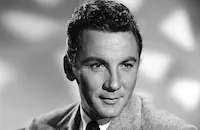
Cameron Mitchell
Ray Flynn
George Peters
John Bohn
Leonard Fisher
Jack Riley
Sam Finn
Lulamae Bohrman
Doris Stone
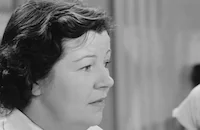
Margaret Bert
Rose Plumer
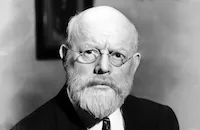
Howard Mitchell
Henry Sylvester
Carl Leviness
Bertha Lelchuk
Crew
Bob Barnes
George Bassman
Peter P. Decker
James Z. Flaster
Karl Freund
Alan Friedman
Cedric Gibbons
Hubert Hobson
Irene
Marion Herwood Keyes
Standish J. Lambert
M. J. Maclaughlin
Inger Norswing
Ralph A. Pender
George Richelavie
Chester W. Schaeffer
De Vallon Scott
Douglas Shearer
Robert W. Shirley
Julian Silberstein
Harkness Smith
Newell Sparks
Herbert Stahlberg
William Steinkamp
Michael Steinore
P. R. Stevens
John A. Williams
Edwin B. Willis
William H. Wright

Film Details
Technical Specs

Articles
A Letter for Evie
For this wartime product's scenario, the MGM story department dusted off a 1922 silent entitled Don't Write Letters. Patriotic gal Evie O'Connor (Marsha Hunt), determined to lift the spirits of some unknown soldier out there, crafts an introductory missive and stuffs it into the shirt pocket of a standard-issue uniform slated for some barracks somewhere. The togs wind up in the hands of the very handsome and just as smarmy Edgar "Wolf" Larson (John Carroll), who's got no interest in Evie's entreaty.
That's not the case for Larson's unprepossessing bunkmate John Phineas McPherson (Hume Cronyn), who responds in Wolf's name and starts an increasingly warm correspondence. The shy McPherson gets himself in even deeper when he honors Evie's request with a photo of the hunky Wolf. Eventually working a transfer to New York, McPherson succeeds in making Evie's acquaintance, only to find her head over heels in love with Larson. Worse, Larson is finally wise to what's going on, and is determined to take advantage of the situation.
It's a harmless, easy-going B-picture, and ably abetted by a good comic cast including Spring Byington, Pamela Britton, Norman Lloyd, and Cameron Mitchell. The cinematography was the work of Karl Freund, whose remarkable career spanned from classic expressionist German silents such as The Last Laugh (1924) and Variety (1925) to the bulk of I Love Lucy's TV run.
Cronyn, who would later work again with Dassin, to much more memorable effect, as the martinet prison warden of Brute Force (1947), had amusing recall of the film's tightrope contest sequence in his memoir A Terrible Liar. "The other contestants, all played by professional wire walkers, had to teeter violently and comically, and then fall off. Julie said he could never shoot the scene satisfactorily unless I walked the wire...
"Under the guidance of one of the professionals, I practiced and practiced and fell and fell," the actor continued. "To call it a bruising experience is an understatement... [A]s I fell, the wire would rip up my side like a paring knife on a carrot, so that from anklebone to armpit I became a mass of yellow, green and blue bruises. Jessica [Tandy, Cronyn's wife] was horrified. Perhaps I should add that I did wear a metal jock strap."
Producer: William H. Wright
Director: Jules Dassin
Screenplay: DeVallon Scott, Alan Friedman; Blanche Brace (story "The Adventure of a Ready Letter Writer")
Cinematography: Karl Freund
Art Direction: Cedric Gibbons, Hubert Hobson
Music: George Bassman
Film Editing: Chester W. Schaeffer
Cast: Marsha Hunt (Evie O'Connor), John Carroll (Edgar 'Wolf' Larson), Hume Cronyn (John Phineas McPherson), Spring Byington (Mrs. McPherson), Pamela Britton (Barney Lee), Norman Lloyd (DeWitt Pynchon), Percival Vivian (Mr. McPherson), Donald Curtis (Capt. Budlowe), Esther Howard (Mrs. Edgewaters), Robin Raymond (Eloise Edgewaters), Therese Lyon (Mrs. Jackson), Lynn Whitney (Miss Jenkins).
BW-90m. Closed captioning.
by Jay S. Steinberg

A Letter for Evie
Jules Dassin (1911-2008) - TCM Schedule Change for Director Jules Dassin Memorial Tribute on Friday, April 20th
Sunday, April 20th
8:00 PM Naked City
9:45 PM Topkapi
TCM REMEMBERS JULES DASSIN (1911-2008)
Jules Dassin gained experience in theater and radio in New York before going to work in Hollywood in 1940, first with RKO (as assistant director) and then with MGM. Dassin hit his stride in the late 1940s with such dynamic (and still well-regarded) film noir melodramas as "Brute Force" (1947), "The Naked City" (1948), "Thieves' Highway" (1949) and "Night and the City" (1950), starring Richard Widmark who died this past Monday, March 24th.
After being blacklisted he moved to Europe, where he scored his greatest international successes with the French-produced "Rififi" (1955) and the then-scandalous "Never on Sunday" (1959), starring his second wife Melina Mercouri. For the most part, his later films--such as "Up Tight" (1968), an ill-conceived black remake of John Ford's 1935 classic "The Informer"--have been disappointing and inconclusive. Dassin, however, maintained that among his own films, his personal preference was "He Who Must Die" (1958), starring his wife Melina Mercouri. It is one of his least known films and is rarely screened today but here is a description of it: "Greece, in the 1920's, is occupied by the Turks. The country is in turmoil with entire villages uprooted. The site of the movie is a Greek village that conducts a passion play each year. The leading citizens of the town, under the auspices of the Patriarch, choose those that will play the parts in the Passion. A stuttering shepherd is chosen to play Jesus. The town butcher (who wanted to be Jesus) is chosen as Judas. The town prostitute is chosen as Mary Magdalene. The rest of the disciples are also chosen. As the movie unfolds, the Passion Play becomes a reality. A group of villagers, uprooted by the war and impoverished, arrive at the village led by their priest. The wealthier citizens of the town want nothing with these people and manipulate a massacre. In the context of the 1920's each of the characters plays out their biblical role in actuality."
Family
DAUGHTER: Julie Dassin. Actor. Mother, Beatrice Launer.
SON: Joey Dassin. Mother, Beatrice Launer.
SON: Rickey Dassin. Mother, Beatrice Launer.
Companion
WIFE: Beatrice Launer. Former concert violinist. Married in 1933; divorced in 1962.
WIFE: Melina Mercouri. Actor, politician. Born c. 1923; Greek; together from 1959; married from 1966 until her death on March 6, 1994.
Milestone
1936: First role on New York stage (Yiddish Theater)
1940: First film as assistant director Directed first stage play, "The Medicine Show 1941: Directed first short film, "The Tell-Tale Heart"
1942: Feature directing debut, "Nazi Agent/Salute to Courage"
Jules Dassin (1911-2008) - TCM Schedule Change for Director Jules Dassin Memorial Tribute on Friday, April 20th
Quotes
Trivia
Notes
While early Hollywood Reporter production charts list Les White as the film's photographer, later production charts list Karl Freund. The extent of White's contribution to the released film has not been determined. The Variety review erroneously refers to this film as A Letter to Evie. Another film with a similar plot, but more serious tone is the 1945 Paramount film Love Letters (see below).















